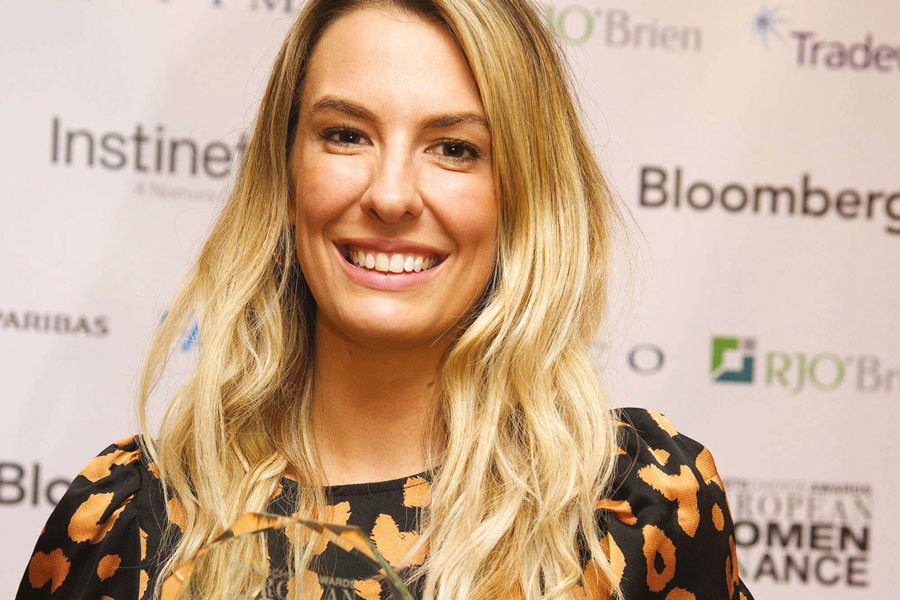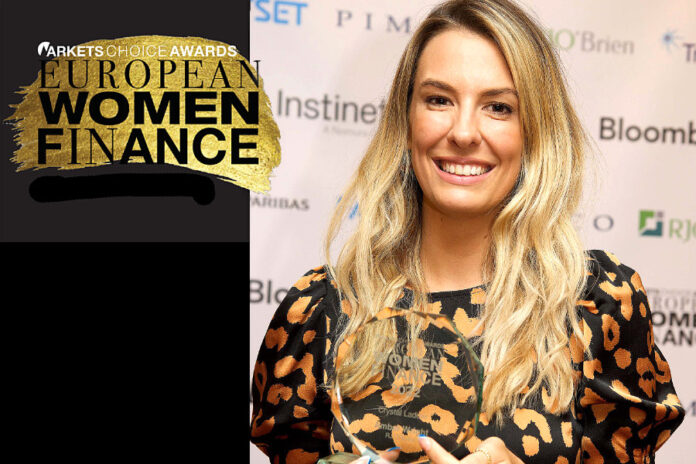 European Women in Finance, Crystal Ladder winner Amber Wright, is Global Head of Fixed Income & E-Trading at RJ O’Brien and discusses maths, efficiency and stereotyping.
European Women in Finance, Crystal Ladder winner Amber Wright, is Global Head of Fixed Income & E-Trading at RJ O’Brien and discusses maths, efficiency and stereotyping.
Can you please tell me what is your day to day role at RJ O’Brien?
I work in global sales and am currently leading two key global initiatives – a significant expansion of the firm’s institutional fixed income product breadth and the enhancement of our technology and algorithmic capabilities across multiple asset classes. I have most recently been working on building out our Treasury/cash bond offering in the US, which involved a full new asset class build-out, from regulatory licensing to trading technology integration and establishing/fortifying relationships with our liquidity providers, prime brokers and clients. RJO has a great presence globally, with offices in the US, Canada, London, Paris and Dubai, among others, and we are continuing our growth into Asia. I am heavily involved with finding new opportunities for the company, whether that be through new brokers, clients or asset classes, or building on our existing infrastructure.
Market conditions have been volatile but what have you found to be the most challenging?
Whilst market conditions have been volatile, the rise in interest rates has obviously been very welcome for the financial services industry. However, after being in pretty much ZIRP (zero interest rate policy) for so long, we have put considerable effort into global growth and diversification of our offering as a means of enhancing revenue and building for the future. The winners will be those that meet new client demands, adapt to technological advances and capture the opportunities. However, with that comes a whole bunch of new challenges with market regulations for new geographical areas along with reporting of new asset classes being at the forefront.
What skill-sets are required for today and have they changed over the past couple of years?
Whilst relationships will always play a large part in sales, unless we have the right infrastructure, we will never be able to compete. With the world becoming ever more technology focused, there is less and less room for manual process and systems. From front-office execution styles to back-office processing, we must become cleverer and faster in the way we work, and a cultural shift towards a technology-first attitude is needed. I do notice that the younger talent have a real added benefit of IT-focused and developer skills. However, I believe the strongest candidates will still have strong sales skills and talent to navigate this new environment.
How did you get started in financial services and is this the career you envisioned? If not, what had been the plan?
Mathematics was always my strongest subject in school and came naturally to me, so it was really my only option to take it forward at university. I definitely never envisioned working in the financial sector, and I applied to multiple internships on the basis that I needed to earn money during the summer to support my studies, having worked multiple part-time jobs too. I was lucky enough to receive a place on Barclays Markets internship, where I was then offered a role on the Fixed Income Relative Value desk. I unfortunately, like many others, had imposter syndrome on a daily basis and struggled to feel like I belonged in this industry. However, as I have matured and gained experience, I am now confident in my abilities and know I deserve to be in the position I am in, from the work I have done. I hope to educate others from backgrounds similar to mine, that they can achieve too.
What progress do you think women have made in financial services? How have things changed since you started?
I think the question itself highlights the problem we still face in this industry. It focuses on what progress the women have made in the financial industry, rather than the men. Finance has always been a stereotypical male-dominated industry, and in a large number of roles, networking plays a huge part, which can be very intimidating for a young woman to enter into. Whilst a lot has been done to change this and educate, I still believe the mindset of some needs to adjust, and I have unfortunately witnessed this first-hand on multiple occasions.
What needs to be done to move the needle further?
When companies are focusing on their figures for graduate scheme intake, etc, to show they meet their diversity criteria, the support seems to stop there. People need to understand that women have achieved the positions they are in because they were the best person for the job and not just to fill a statistic.
How does your firm support women and diversity, equity and inclusion (DEI) in general?
Diversity, equity and inclusion (DEI) is supported through the RJO culture. RJO is a family-owned global firm working with a diverse group of clients, and this is reflected in the employees too. It is obvious to me that RJO believes that different ideas and perspectives create better outcomes for our community, and the leadership continues to build and foster a culture where our differences are celebrated, and everyone is respected and included. As part of the executive team at RJO, I feel supported in having my voice heard, and it is comforting to see the number of women in leadership positions.
How are you involved?
I foster RJO’s culture in everything I do on a day-to-day basis. I have recently become more involved in recruitment, and we always aim to speak with a diverse pool of candidates. I also participate in the Woman’s Initiative Network (WIN Committee) which has been a strong community at RJO before I joined. I believe across multiple departments; I have made an impact in showing the care I have for all employees and the support they can receive from me should they ever need it. Having been fortunate to take on a leadership position in the company, I want to become a role model for others around in how I conduct myself, whilst giving others the platform to show their talents.
There is a plethora of awards for women in the financial sector? How long do you think it will be before we won’t need a special category?
Whilst the current financial services sector has done a lot to promote women in the industry, I believe that it won’t be until the next generation has made its way into executive positions that we’ll have a full diversity pool at the top.
©Markets Media Europe 2023
©Markets Media Europe 2025


























